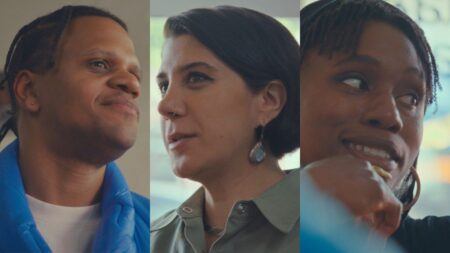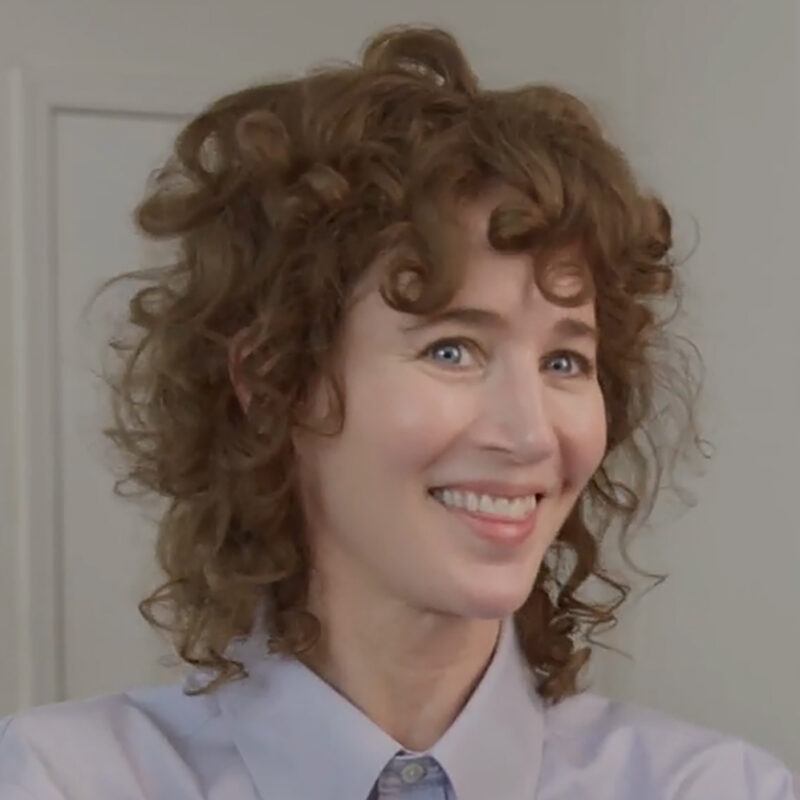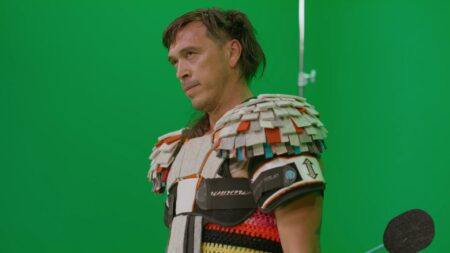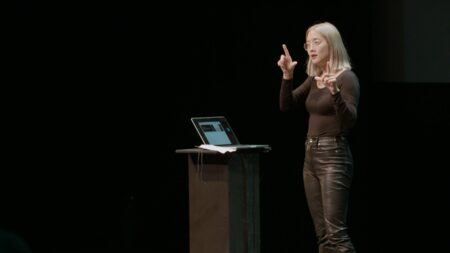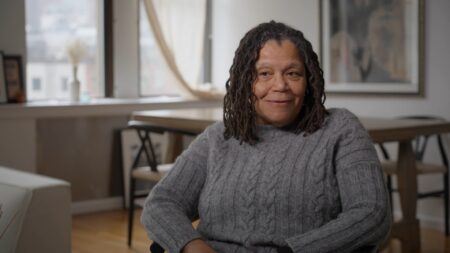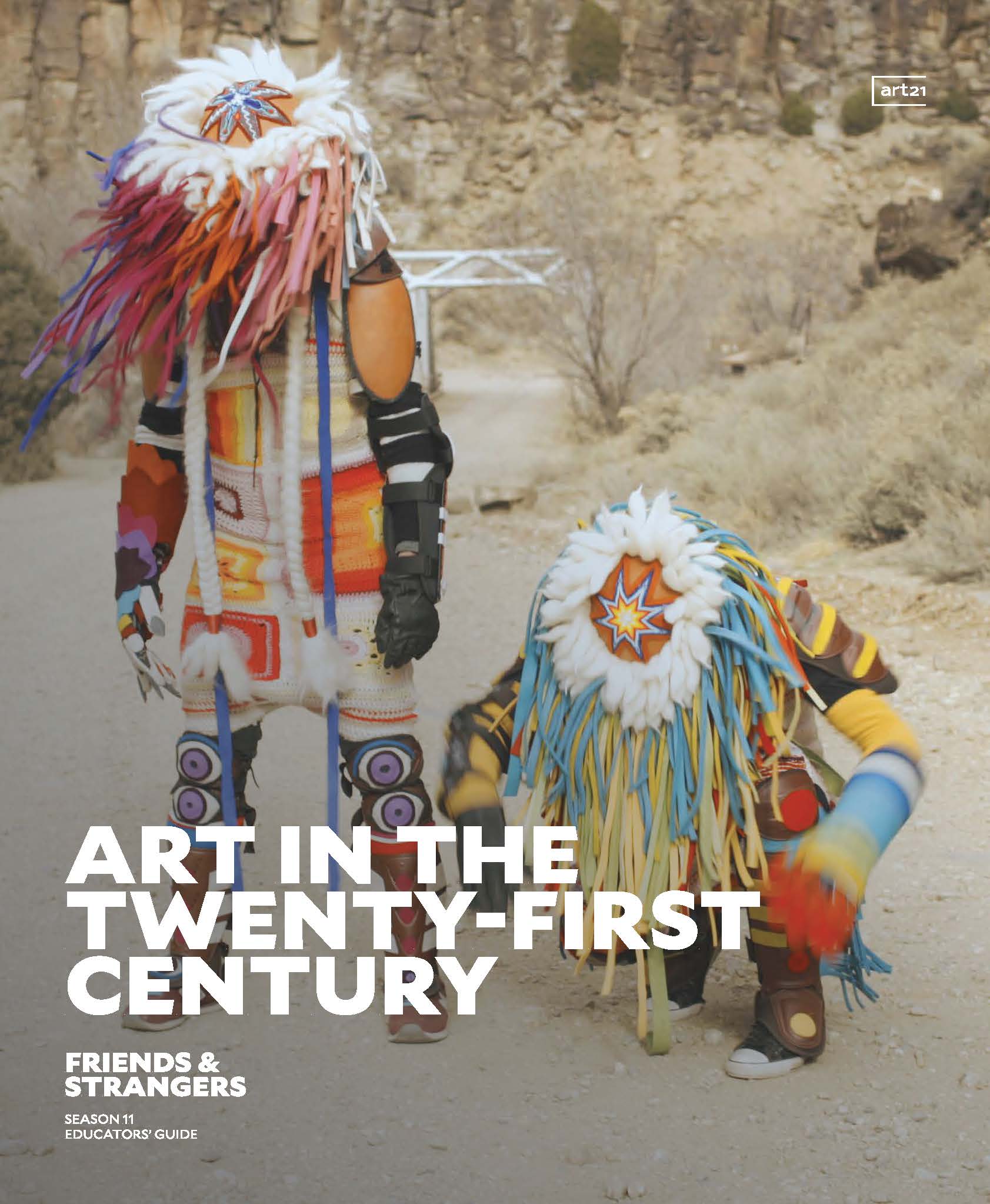Continue playing
(Time remaining: )
Play from beginning
Continue playing "{{ controller.videos[controller.getVideo(controller.currentVideo)].segmentParentTitle}}"
{{controller.videos[controller.getVideo(controller.currentVideo)].title}} has ended.
Miranda July in "Friends & Strangers"
Descriptive audio version available here.
Visit our Awards page for this film’s honors and recognition.
Holding a spool of ribbon, footsteps drumming a steady beat on the sidewalks of Los Angeles, artist Miranda July makes her way to a gas station. The artist asks commuters passing through to participate in a performance, handing them a section of ribbon to hold until they need to leave, gradually spinning a loose web connecting these disparate individuals. “My great hope was that, through my work, I could have intimacy with other people,” says July, and this drive to find intimacy, friendship, and family has become the subject of much of her work. July began making performances at a young age, writing and directing her first play as a teenager based on her correspondence with a man in prison, which was called The Lifers (1992). Years later, the artist began Joanie 4 Jackie, a chain letter of films made by women filmmakers that provided her with a community from which to develop as a filmmaker herself. The project continued from 1995 to 2005 when July premiered her first feature film, Me and You and Everyone We Know (2005), which she directed and starred in.
In early performances, the artist frequently had to fight to be recognized and respected on stage, but as her films gained popularity, her need to insist on her right to be there diminished. In light of this, July found new ways to bring risk and vulnerability to her performances by asking her audiences to participate. In Things We Don’t Understand and Definitely Are Not Going to Talk About (2006), the artist calls upon the audience to act in the lead roles of the performance. Since then, July has continued to ask a lot of her collaborators and only works with those willing to rise to the challenge. In 2020, the artist met Jay Benedicto, a telemarketer from Dulag, Philippines, and the two embarked on a collaborative project. July sent Benedicto prompts for photographs, and she would respond with material July would leave as is or collage together with elements from Benedicto’s Facebook page or their conversations. The collaboration appeared in a special issue of Süddeutsche Zeitung and was later published as a stand-alone book titled Services (2020). “That’s part of the risk thing,” says July. “Literally anything is possible in the moment. It is kind of like being in a dream or something, but a shared dream.”
Credits
Executive Producer: Tina Kukielski. Series Producer: Nick Ravich. Director: Chiemi Karasawa. Editors: Mary Ann Toman, Lynn True. Cinematography: Daud Sani. Archival Producer: Leah Ford. Associate Producer: Andrea Chung. Assistant Curator: Jurrell Lewis. Design & Animation: Ryan Carl, Nikita Iziev. Composer: Andrew Orkin. Additional Photography: Bennett Cerf, Darlene Joanna Young. Location Sound: Jedd Dumaguina, Luiza Sá-Davis. Advising Producer: Ian Forster.
Additional Art21 Staff: Lauren Barnett, Hannah Degarmo, Lolita Fierro, Joe Fusaro, Molaundo Jones, Emma Nordin, Anna Pruett, Jessica Svenson, Noor Tamari, Nora Wimmer.
Production Assistants: Kelsey Bland, Emily Joe. Video Post-Production Services: Cut + Measure. Video Post-Production Producer: Alex Laviola. Colorist: Chris Ramey. Online & Conform: David Gauff. Additional Video Editors: Addison Post, Adam Varca. Additional Animation: Andy Cahill. Audio Post-Production Sound Services: Konsonant Post. Re-Recording Mixer: Gisela Fullà-Silvestre. Sound Editor: Ben Kruse. Assistant Editors: Ellen Askey, Stephanie Cen, Michelle Hanks. Additional Research: Susan Thompson. Station Relations: De Shields Associates. Legal Counsel: Franklin Weinrib Rudell + Vassallo.
Interns: Stephanie Ades, Sekou Cherif, Yeon Cho, Michaela Esteban, Emma Flood, Amber He, Emma Kanne, Carina Martinez, Renee Rienecker, James Santiago, Dani Wieder.
Artwork Courtesy: Miranda July.
Archival Materials: BAM Hamm Archives; Aubree Bernier-Clarke; Film4; IFC Films; The Kitchen; Universal Studios Licensing LLC; Ventureland; Walker Art Center, Minneapolis.
Special Thanks: The Art21 Board of Trustees, Jay Benedicto, Laura Coxson, Larkin Donley, Elizabeth Litvitskiy, Media Mavens, Sam Nichols, Ryan Pattie.
Major underwriting for Season 11 of Art in the Twenty-First Century is provided by PBS, National Endowment for the Arts, Lambent Foundation, The Anna-Maria and Stephen Kellen Foundation, The Andy Warhol Foundation for the Visual Arts, The Horace W. Goldsmith Foundation, Toby Devan Lewis, Robert Lehman Foundation, and Nion McEvoy & Leslie Berriman.
Series Creators: Susan Dowling and Susan Sollins.
©2023 Art21, Inc.
Closed captionsAvailable in English, German, Romanian, Italian, Japanese, Korean, Chinese, Italian
Through the Art21 Translation Project, multilingual audiences from around the globe can contribute translations, making Art21 films more accessible worldwide. Translate this video now.
Interested in showing this film in an exhibition or public screening? To license this video please visit Licensing & Reproduction.
Miranda July was born in 1974 in Barre, Vermont, and lives and works in Los Angeles, California. July studied at the University of California, Santa Cruz, before leaving the university to pursue filmmaking. The artist works across media in her practice, from staged performances and feature films to impromptu dance and short videos posted on social media, from novels and short-story collections to sculptural installations at the Venice Biennale. In each of these varied media, July examines different models and modes of connecting with people, from close friends and family to total strangers, and shows audiences how these connections might transform our lives and the world around us.
“That’s part of the risk thing. Literally anything is possible in the moment. It is kind of like being in a dream or something, but a shared dream.”
Miranda July
